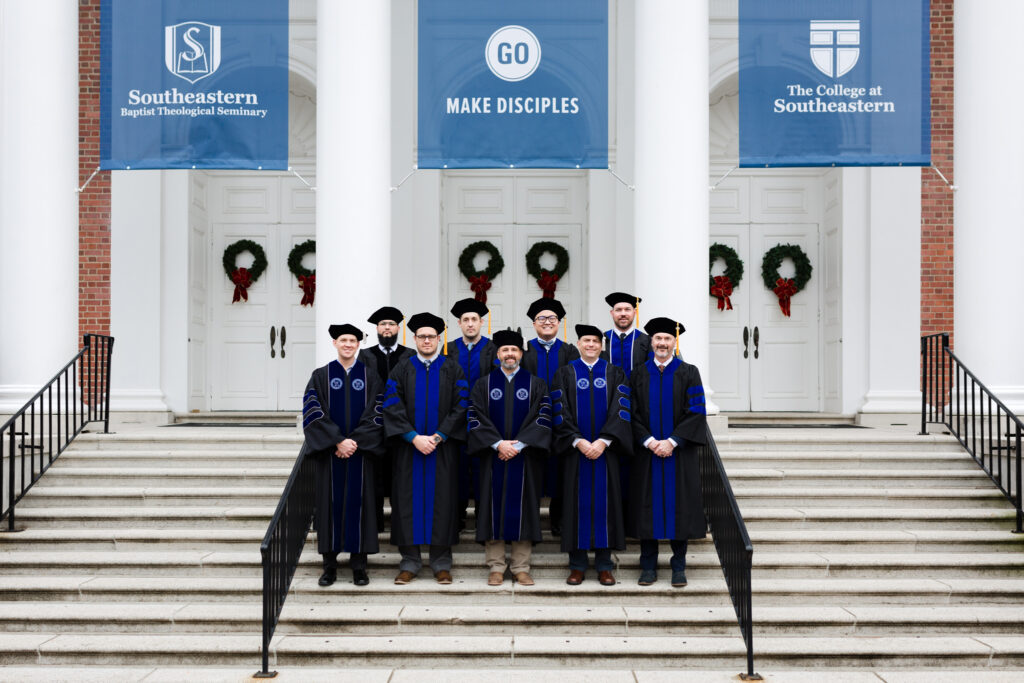What transcripts are required?
Official transcripts from ALL schools that you have previously attended post high school are required.
Does that mean if I have an MBA, a M.Ed., a law degree or another degree that is not theologically related that I need to request that transcript be sent also?
Yes, it does.
Why are transcripts required?
Besides being an accreditation requirement, transcripts are required so that we may confirm that you have the coursework necessary to be successful in our program, and that you will be able to handle the rigor of doctoral level work.
What is MDiv Equivalency?
To meet MDiv Equivalency, applicants must have completed 60 credit hours of study with at least 49 credit hours completed at the graduate level. In addition, the following courses must be completed.
- NT Survey I, II (6hrs.) Doctrine Survey I, II (6hrs.)
- OT Survey I, II (6hrs.) Church History I, II (3-6hrs.)**
- Greek I, II (6-9hrs.)* Hermeneutics (3hrs.)
- Hebrew I, II (6-9hrs.)* Baptist History (3hrs.)***
*Biblical language expectations depend on applicant’s given Area of Study
**Applicants must have studied the Patristic, Medieval, Reformation and Modern eras.
***Baptist History is required for applicants pursuing Historical Theology and Theological Studies: Historical Theology
These courses can be completed at the undergraduate level. We will accept a maximum of 27 credit hours from the undergraduate level.
After that explanation, I am not sure whether I have all the coursework required? How can I check?
We are happy to look over your transcripts and evaluate them to confirm that you meet our MDiv Equivalency requirements. You can email unofficial transcripts to [email protected]
If I need additional coursework, do I have to stop the application process?
Every situation is unique. However, most applicants with 1-2 required courses can proceed through the application process while completing their leveling work.
Do I have to take the courses that I am missing from SEBTS?
You are welcome to take the coursework from any accredited institution.
Will my GPA from my undergraduate degree be considered?
No, we only look at all your “Graduate” level work to determine whether your GPA is 3.5 or above.
Will my MBA or other graduate degrees that have no theological coursework be considered in my overall GPA?
Yes, ALL graduate level work is considered when calculating an applicant’s GPA. We expect an applicant to have a minimum cumulative grade point average of 3.5 on ALL previous master’s level work.
What are my options if my GPA is too low?
If you just missed the mark but have required leveling work to complete, you may be able to bring your GPA up that way. If you don’t have required leveling work, or your GPA is far below the 3.5 mark, we recommend pursuing the ThM program as a way of continuing into PhD work.
Can I submit my application before finishing my current degree?
Yes, you can send us an unofficial transcript for the admissions process. If you are admitted to the program, you will be granted an acceptance that is contingent on the completion of your current degree. Once your degree is conferred, please request an official transcript to be forwarded to us.
NOTE: It take several weeks after graduation for transcripts to show the degree was conferred. So, confirm that the institution has had time to confer the degree on your transcript before requesting it be sent to us.
Where do I submit my transcripts?
Please submit official transcripts directly to the Office of PhD Studies. If your institution sends transcripts electronically, please have them sent to [email protected].
What is the address of the PhD office?
Office of PhD Studies
SEBTS: Carson Hall 204
P.O. Box 1889
244 N. Wingate Street
Wake Forest, NC 27588-1889
